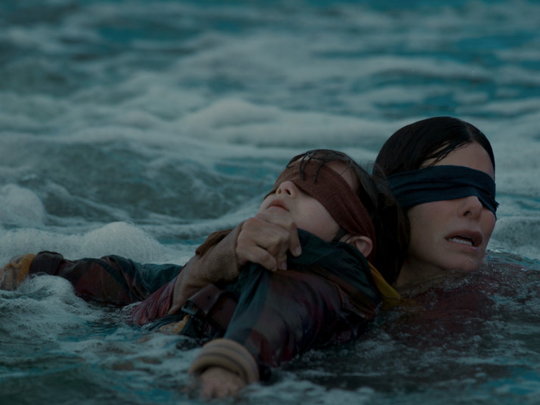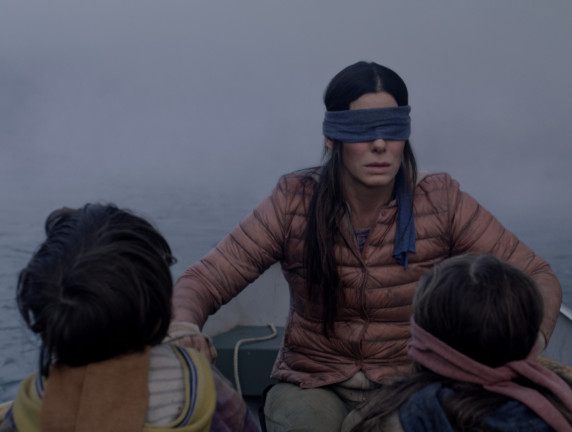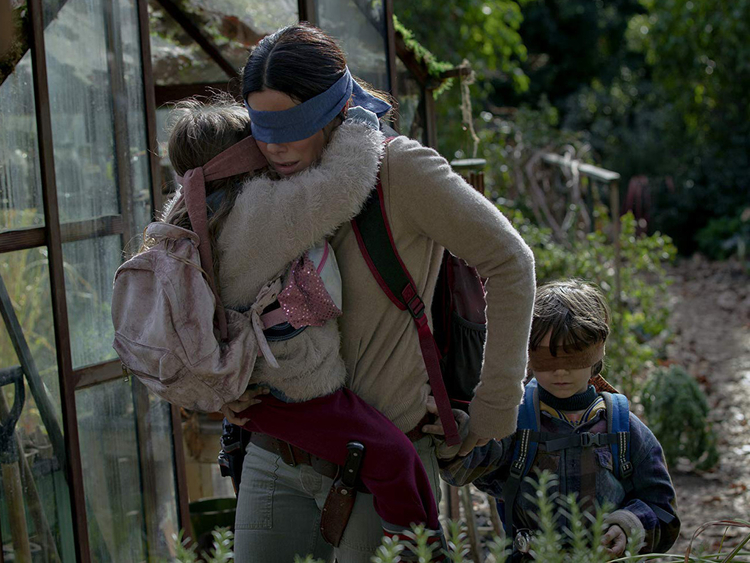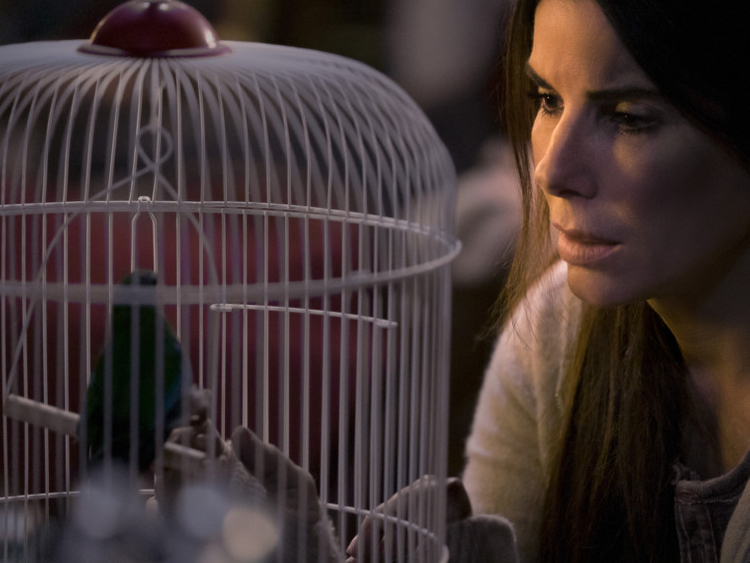
In Susanne Bier’s ‘Bird Box,’ an end-of-days freakout starring Sandra Bullock, the world is overrun by an inexplicable menace with a clever plan for wiping out humanity. To those of us in the audience, the creatures (or whatever they are) remain entirely invisible, represented by a sudden rush of wind, which makes them about as scary as a leaf blower. But if you were a character in the movie and looked in their direction, your eyes would turn blood-red and you would be seized by an immediate, irresistible urge to kill yourself, probably by dashing your head repeatedly against the nearest hard surface.
I am glad to report that the movie itself, creepy and diverting enough on its own workmanlike terms, induces no such impulse. It could have, I suppose, but Bier is too much of a professional to drop a stray reel from ‘Paul Blart: Mall Cop’ midpicture. Instead, she applies herself — as does the screenwriter, Eric Heisserer (‘Arrival’), adapting Josh Malerman’s 2014 debut novel — to the challenge of representing a horror that, in every sense, cannot be seen.
This is a different order of business from the year’s other high-concept sensory-deprivation thriller. In ‘A Quiet Place,’ the characters must avoid making noise to evade the attention of murderous monsters.
In ‘Bird Box,’ the survivors must constrain their own senses, which might be even harder. For much of the picture, we watch a tightly wound Malorie (Bullock) and two quietly obedient children (Julian Edwards and Vivien Lyra Blair) make their way around in blindfolds — a task that becomes trickier when they are forced to spend hours kayaking down an icy, turbulent river.
What happened? How did they get here? Where are they going? The movie provides answers — not all of them, but a few — by flashing back five years, when a wave of mass spontaneous suicides breaks out worldwide. Chaos erupts at the hospital where Malorie, six months pregnant, is seeing a doctor with her sister (Sarah Paulson, gone too soon). Malorie’s frantic drive home becomes a bravura piece of doomsday action choreography, with self-crashing vehicles and people screaming and fleeing en masse, as one after another makes the mistake of laying eyes on the creatures.
Amid the fiery chaos, Malorie is pulled into a large house whose inhabitants have the good sense to lock the doors and cover the windows. At this point, ‘Bird Box’ effectively becomes a zombie movie sans zombies, in which a motley crew of survivors — including Trevante Rhodes, Lil Rel Howery, BD Wong, Jacki Weaver and a surly, shotgun-toting John Malkovich — find themselves trapped in a single location.
This one is fairly spacious, all things considered. The usual clash of personalities ensues, plus moments of teamwork, bonding and it’s-the-apocalypse sex. Rations and supplies run low; the slightest glimpse of daylight can prove deadly. Desperate survivors come pounding at the door at night, including another pregnant woman (a touching Danielle Macdonald) and a man (an unnerving Tom Hollander) who provides a chilling clue about the rapidly evolving nature of the outside threat. And then there are the caged birds, which turn out to have useful perceptual powers where the monsters are concerned, and whose imprisonment is clearly a metaphor for the characters’ own.
The actors give the material a boost: Much as he did in ‘12 Strong’ and ‘The Predator,’ the handsome Rhodes emerges as a kind of B-movie ensemble MVP — after Bullock, of course, with whom he strikes up a warmly emotional rapport. For her part, Bullock remains an effortlessly watchable action heroine, though her natural comic spark has been tamped down in service of a character who becomes increasingly humourless and raw-nerved as the body count spikes.
Presumably, we will learn how Malorie becomes the joyless, no-nonsense mom who denies her poor kids even the slightest moment of levity and, as the movie notes in overly emphatic dialogue, has sacrificed living for the sake of survival. ‘Bird Box’ keeps cutting back and forth in time, between the house under siege and the boat on the river, a see-saw tactic that opens up the story visually but also undercuts the suspense on both ends. One form of narrative monotony is effectively replaced with another.
More celebrated for the nimble early pictures she directed in her native Denmark (‘After the Wedding,’ ‘Brothers’) than for her rickety forays into Hollywood melodrama (‘Things We Lost in the Fire,’ ‘Serena’), Bier plunges herself into mainstream horror filmmaking with a gusto that doesn’t always offset her lack of precision. For visceral intensity, she never tops the early scenes of mayhem and mass panic; slow-building, artfully modulated tension in close quarters seems beyond the movie’s interest or purview. The scares keep getting more and more desperate, cranking up the volume with gale-force winds and eerie voices, en route to an ending that’s silly verging on offensive.
Although far better than M Night Shyamalan’s mass-suicide thriller ‘The Happening’ — scant praise, I know — ‘Bird Box’ never really makes its unseen villains work conceptually. The horror remains strictly theoretical when it should instead be palpable. The movie’s wan, derivative pleasures fly completely in the face of its premise: You’ve seen this all many times before, which doesn’t mean you’ll mind seeing it again.
___
Don’t miss it
‘Bird Box’ releases streams on Netflix from December 21.












